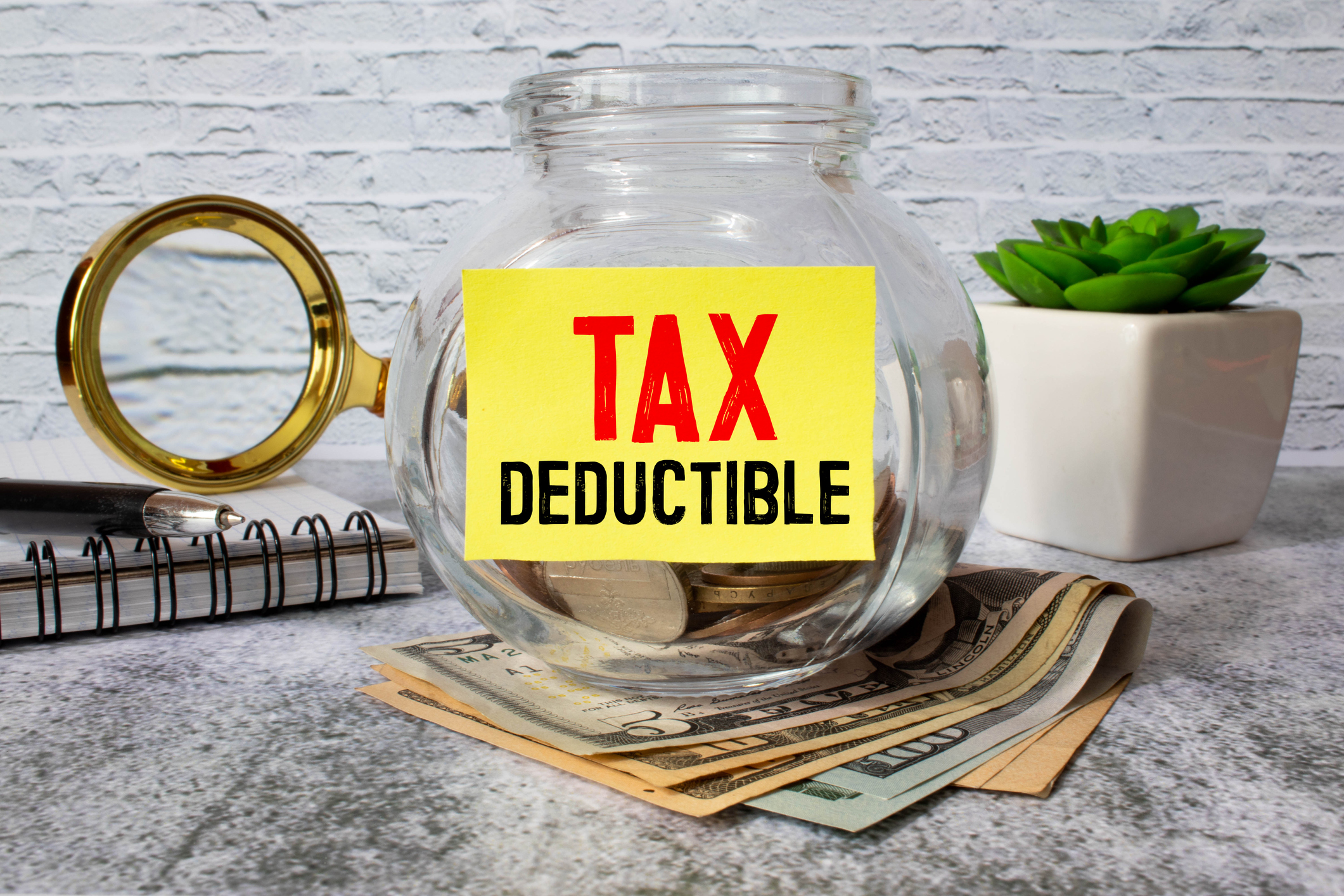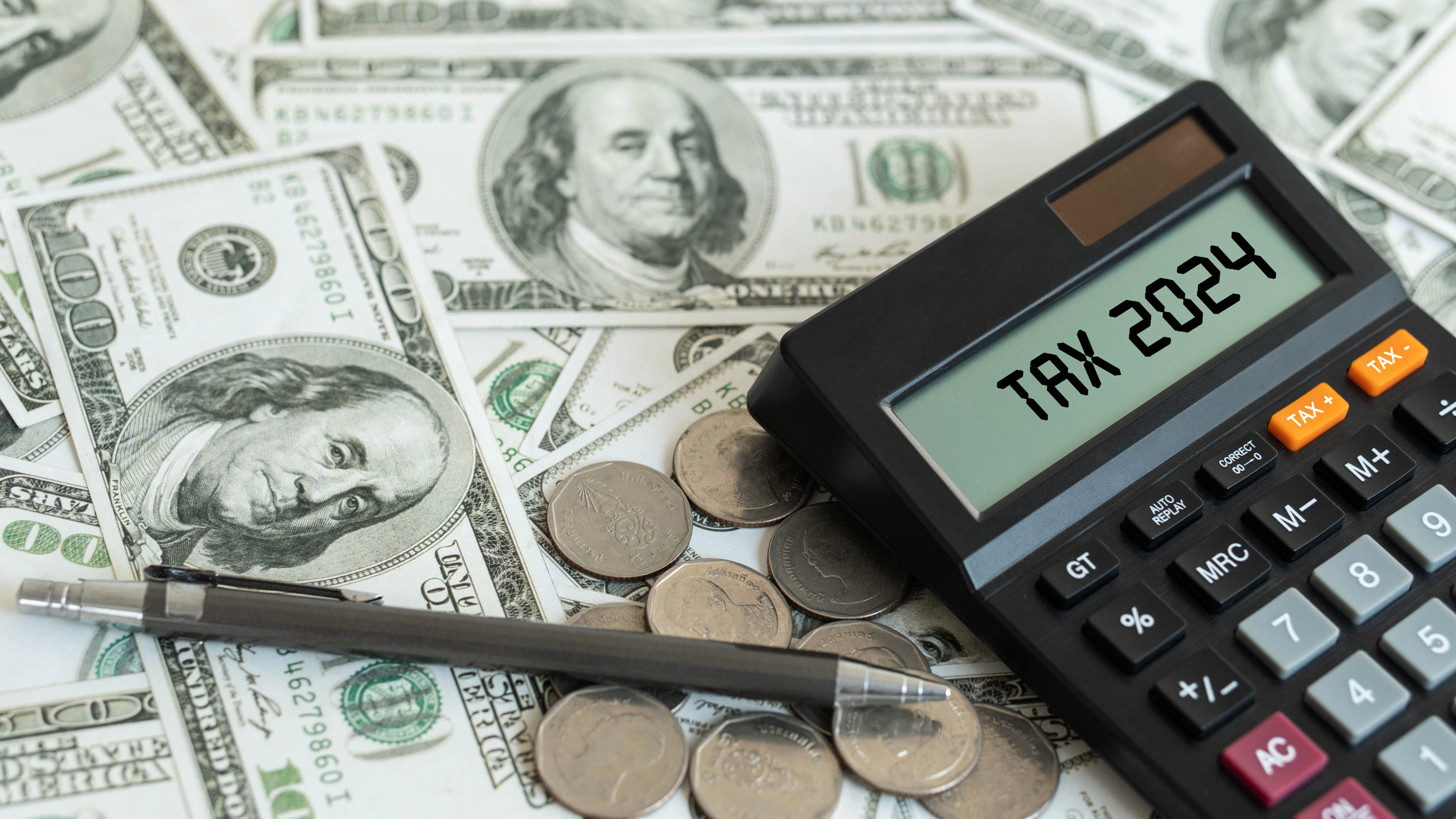Tax Changes and Key IRS Amounts for 2025
There are lots of tax changes for the 2025 tax year. Some reflect prior-year inflation. Others are new rules. But one thing is certain... all taxpayers are affected.


Profit and prosper with the best of Kiplinger's advice on investing, taxes, retirement, personal finance and much more. Delivered daily. Enter your email in the box and click Sign Me Up.
You are now subscribed
Your newsletter sign-up was successful
Want to add more newsletters?

Delivered daily
Kiplinger Today
Profit and prosper with the best of Kiplinger's advice on investing, taxes, retirement, personal finance and much more delivered daily. Smart money moves start here.

Sent five days a week
Kiplinger A Step Ahead
Get practical help to make better financial decisions in your everyday life, from spending to savings on top deals.

Delivered daily
Kiplinger Closing Bell
Get today's biggest financial and investing headlines delivered to your inbox every day the U.S. stock market is open.

Sent twice a week
Kiplinger Adviser Intel
Financial pros across the country share best practices and fresh tactics to preserve and grow your wealth.

Delivered weekly
Kiplinger Tax Tips
Trim your federal and state tax bills with practical tax-planning and tax-cutting strategies.

Sent twice a week
Kiplinger Retirement Tips
Your twice-a-week guide to planning and enjoying a financially secure and richly rewarding retirement

Sent bimonthly.
Kiplinger Adviser Angle
Insights for advisers, wealth managers and other financial professionals.

Sent twice a week
Kiplinger Investing Weekly
Your twice-a-week roundup of promising stocks, funds, companies and industries you should consider, ones you should avoid, and why.

Sent weekly for six weeks
Kiplinger Invest for Retirement
Your step-by-step six-part series on how to invest for retirement, from devising a successful strategy to exactly which investments to choose.
2025 starts with one set of federal tax rules. But there very well could be major changes. Odds are decent this year for notable tax legislation. Most of the key tax provisions affecting individuals in the 2017 Tax Cuts and Jobs Act expire after 2025, including lower income tax rates and wider tax brackets, higher standard deductions and bigger child tax credits, and the larger lifetime estate and gift tax exemption. Additionally, Donald Trump has made tax changes a priority on his legislative agenda. If lawmakers act as expected, we could see legislation sometime this year, most likely in the second half of 2025.
We believe most changes in any new tax law enacted this year would take place prospectively, starting in 2026. That makes the most sense, given the 2025 expiration of the 2017 ta aw. Also, note that Trump won't get everything in his tax wish list, given the extremely slim Republican majority in the House and a non-filibuster proof GOP majority in the Senate. Additionally, there is the massive $36 trillion federal debt to consider.
For now, we will note the important tax law changes and adjustments that are currently in place for the 2025 tax year, with some related items grouped together. Pay attention to these changes because they can help or hurt your bottom line, and they are essential to note for proper tax planning. Use this information now so you can hold on to more of your hard-earned money when it's time to file your 2025 federal income tax return (in early 2026).

Retirement plan changes 2025
Inherited IRAs
Annual required minimum distributions (RMD) begin in 2025 for many IRAs inherited after 2019.
A 10-year clean-out rule generally applies to IRAs inherited after 2019. The funds must be paid to the beneficiary within 10 years after the year of death. So, if an IRA owner dies in October 2024, the beneficiary must clean out the IRA no later than December 31, 2034. Spouses, minor children (until age 21), the chronically ill or disabled, and people not more than 10 years younger than the decedent are exempt from the 10-year rule.
If an IRA owner dies before his or her RMD beginning date, then beneficiaries needn't take annual distributions. They can opt to wait until year 10 to take the money, get yearly distributions, or skip years, provided the IRA is fully depleted by the end of the 10-year period.
If an IRA owner dies on or after his or her RMD start date, then IRA beneficiaries must withdraw at a minimum annual RMDs from the inherited IRA during the 10-year period, generally beginning with the year after the original owner died, and then fully deplete the IRA by year 10 at the latest. In this situation, the beneficiary generally figures annual RMDs based on his or her own life expectancy, so the younger the beneficiary, the smaller the yearly RMD amounts.
There is relief if the owner died in 2020, 2021, 2022 or 2023. Beneficiaries of IRAs in which the original owner was already subject to RMDs won't be penalized for not taking distributions in 2021-24. They needn't make up for the missed distribution. But they must take an RMD starting in 2025.
Note that although beneficiaries of Roth IRAs inherited after 2019 are also subject to the 10-year cleanout rule, they do not have to take annual RMDs over those 10 years.
Dollar Limits for 401(k)s and IRAs
Key dollar limits on workplace retirement plans, such as 401(k)s and IRAs, increase in 2025.
- The maximum 401(k) contribution is $23,500. And catch-up limits change. People age 60 to 63 can put in an additional $11,250. The catch-up limit for other people born before 1976 is $7,500. These limits also apply to 403(b)s and 457 plans.
- SIMPLEs have a $16,500 cap for 2025, plus $3,500 for individuals age 50 and older. If age 60-63 in 2025, the $3,500 catch-up figure is replaced with $5,250.
- The 2025 contribution cap for traditional IRAs and Roth IRAs remains $7,000, plus $1,000 as an additional catch-up contribution for individuals age 50 and older.
- The income ceilings on Roth IRA pay-ins are higher for 2025. Contributions phase out at adjusted gross incomes of $236,000 to $246,000 for joint filers and $150,000 to $165,000 for single filers.
- 2025 deduction phaseouts for traditional IRAs range from adjusted gross incomes of $126,000 to $146,000 for joint filers covered by 401(k)s and $79,000 to $89,000 for single filers and heads of household. If only one spouse is covered by the plan, the phaseout range for deducting contributions for the uncovered spouse is $236,000 to $246,000 of adjusted gross income.
- The IRA qualified charitable distribution (QCD) cap is $108,000 for 2025. People who are age 70 1/2 or older can transfer up to $108,000 from their traditional IRAs directly to charity in 2025. QCDs can count as part of your required minimum distribution, but they are not taxable and they are not included in your adjusted gross income.

Tax credits and deductions 2025
Federally declared disasters
There is relief for victims of federally declared disasters, such as hurricanes, tornadoes, blizzards, wildfires and severe flooding, mainly in 2021-2024. Individuals can deduct personal disaster losses even if they don't itemize. They are able to deduct uninsured personal losses in excess of a $500 threshold without regard to the 10%-of-adjusted-gross-income offset that generally applies. This net loss is treated as an additional standard deduction for taxpayers. Although this easing applies mainly to pre-2025 tax years, many people aren't aware of it. That's because federal lawmakers quietly passed the law near the end of 2024. If you suffered losses in a 2024 federally declared disaster, you can apply the rules on your 2023 tax return or your 2024 Form 1040. And if your losses were derived from a disaster in 2021-2023, then you can amend those returns if it will help you tax-wise.
Adoption tax credit
The adoption credit is taken on up to $17,280 of qualified expenses in 2025. The full credit is available for a special-needs adoption even if it costs less. The credit phases out for filers with modified adjusted gross incomes over $259,190 and ends at $299,190
Standard Deduction
Standard deduction amounts for 2025 have been inflation-adjusted and are higher than they were last year. Joint filers get $30,000, plus $1,600 for each spouse age 65 or older. The amount for single filers is $15,000 and increases to $17,000 if age 65 or up. Head of household filers get $22,500 plus $2,000 more once they reach 65. Blind people receive $1,600 more ($2,000 if unmarried and not a surviving spouse). For more information, see our guide to 2025 standard deductions.
Long-term-care premiums
The limits for deducting long-term care premiums increase for 2025. Taxpayers aged 71 or older can deduct as much as $6,020 per person. Filers age 61 to 70 can write off up to $4,810 per person. Those who are 51 to 60 can deduct up to $1,800 per person. Individuals aged 41 to 50 can take up to $900 per person. And people aged 40 and younger get $480 per person. For most taxpayers, long-term-care premiums are deductible only by people who itemize on Schedule A of the 1040 and only to the extent that total medical expenses exceed 7.5% of adjusted gross income. Self-employed individuals can deduct the premiums on Schedule 1 of the 1040.

Key tax amounts 2025
Tax brackets
The income tax brackets for individuals are much wider for 2025 because of inflation during the 2024 fiscal year. Tax rates are unchanged. To view income tax brackets for the 2024 and 2025 tax years, see 2024 and 2025 Tax Brackets and Federal Income Tax Rates.
Capital gains and qualified dividends
The favorable tax rates on long-term capital gains and qualified dividends do not change. But the income thresholds to qualify for the various rates go up for 2025. The 0% tax rate applies to taxable incomes up to $96,700 for joint filers, $64,750 for heads of household and $48,350 for single filers. The 20% tax rate starts at $600,051 for joint filers, $566,701 for heads of household and $533,401 for single filers. The 15% tax rate is for filers with taxable incomes between the 0% and 20% break point.
Alternative minimum tax
Alternative minimum tax (AMT) exemptions rise for 2025 to $137,000 for couples and $88,100 for single filers and household heads. The AMT exemption phaseout zones start at $1,252,700 for joint filers and $626,350 for others. The 28% AMT rate kicks in above $239,100.
Kiddie tax
The kiddie tax has less bite in 2025. The first $1,350 of unearned income of a child under age 19 (under age 24 if a full-time student) is tax-free. The next $1,350 is taxed at the child’s rate. Any excess is taxed at the parent’s rate.
Fringe Benefits
Employees covered by health flexible savings accounts (FSAs) can defer up to $3,300 in 2025. The cap on tax-free employer-provided parking for 2025 is $325 a month. The exclusion for mass transit passes and commuter vans match that amount. U.S. taxpayers working abroad have a $130,000 income exclusion for 2024, provided they meet all the eligibility requirements.
HSAs
The contribution limits to health savings accounts (HSAs) are higher in 2025. Individuals can contribute up to $4,300 to their HSA accounts for 2025. The contribution limit is $8,550 for people who have family coverage. People born before 1971 can put in an extra $1,000.

Estate and gift taxes 2025
The lifetime estate and gift tax exemption for 2025 is $13,990,000. After 2025, the exemption is slated to fall back to about $7 million, unless Congress acts to extend the higher amount.
The special estate tax valuation of farm and business real estate goes up for 2025. Up to $1,420,000 of farm or business real estate can receive discount valuation, letting estates value the real property at its current use instead of fair market value. To qualify, the real estate must make up at least one-half of the estate, and realty making up 25% or more of the estate must be used in a business or actively farmed by the decedent or her family for five or more years in the eight years before death.
More estate tax liability qualifies for an installment payment tax break. If one or more closely held businesses make up greater than 35% of a 2025 estate, as much as $760,000 of tax can be deferred, and the IRS will charge only 2% interest.
The annual gift tax exclusion for 2025 is $19,000 per donee. That means in 2025, you can gift up to $19,000 to each child, grandchild or any other person without having to file a gift tax return or tap your lifetime estate and gift tax exemption. Annual gifts over the exclusion amount will trigger filing of a gift tax return for 2025, but no gift tax will be due unless your total lifetime gifts exceed $13,990,000.

Business tax changes 2025
Depreciation and 179 expensing
First-year bonus depreciation isn’t as valuable in 2025. Last year, businesses could deduct 60% of the cost of new and used qualifying business assets with lives of 20 years or less. This year, the 60% write-off decreases to 40%.
But Section 179 expensing is higher. $1,250,000 of assets can be expensed in 2025. This limit phases out dollar-for-dollar once more than $3,130,000 of assets are placed in service in 2025. Note that the amount of business assets expensed can't exceed the business's taxable income. Bonus depreciation doesn't have this rule.
Pass-through income
A key dollar threshold on the 20% deduction for pass-through income rises in 2025. Self-employed individuals and owners of LLCs, S corporations and other pass-through entities can deduct 20% of their qualified business income, subject to limitations for individuals with taxable incomes of more than $394,600 for joint filers and $197.300 for all others. Note that independent contractors and gig workers who aren't employees can claim this write-off from their earnings. Additionally, if you are a landlord, Schedule E rental income may be eligible for the 20% deduction in some cases.
Accounting method
More companies can use the cash method of accounting. For taxable years beginning in 2025, C corporations with average annual gross receipts of $31 million or less over the previous three years can use the cash method. This threshold also applies to partnerships and LLCs that have C corporations as owners.
Mileage rates
The 2025 standard mileage rate for business driving is 70 cents per mile. The mileage allowance for medical travel and military moves is 21 cents per mile in 2024. The charitable driving rate is fixed by law and stays put at 14 cents a mile.
Related Content
Profit and prosper with the best of Kiplinger's advice on investing, taxes, retirement, personal finance and much more. Delivered daily. Enter your email in the box and click Sign Me Up.

Joy is an experienced CPA and tax attorney with an L.L.M. in Taxation from New York University School of Law. After many years working for big law and accounting firms, Joy saw the light and now puts her education, legal experience and in-depth knowledge of federal tax law to use writing for Kiplinger. She writes and edits The Kiplinger Tax Letter and contributes federal tax and retirement stories to kiplinger.com and Kiplinger’s Retirement Report. Her articles have been picked up by the Washington Post and other media outlets. Joy has also appeared as a tax expert in newspapers, on television and on radio discussing federal tax developments.
-
 Ask the Tax Editor: Federal Income Tax Deductions
Ask the Tax Editor: Federal Income Tax DeductionsAsk the Editor In this week's Ask the Editor Q&A, Joy Taylor answers questions on federal income tax deductions
-
 States With No-Fault Car Insurance Laws (and How No-Fault Car Insurance Works)
States With No-Fault Car Insurance Laws (and How No-Fault Car Insurance Works)A breakdown of the confusing rules around no-fault car insurance in every state where it exists.
-
 7 Frugal Habits to Keep Even When You're Rich
7 Frugal Habits to Keep Even When You're RichSome frugal habits are worth it, no matter what tax bracket you're in.
